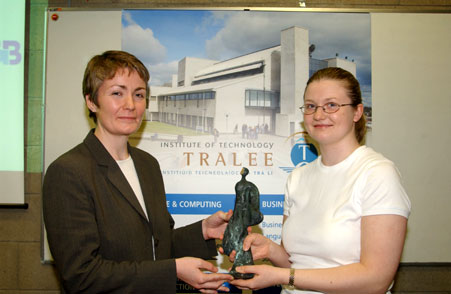| 2003 |

|
YEAR BOOK |
Institute of Technology Tallaght
|
Synthetic organic chemistry research at IT Tallaght
|

A recurrent theme in organic chemistry research at IT Tallaght is Host-Guest chemistry, which involves the interaction and recognition between two, or more, molecules. The main hosts studied thus far are macromolecules (calixarenes and molecular clips), and the preparation of these complex structures requires a large input of organic synthetic methodology. These artificial receptors are helping our understanding of the components necessary for molecules to recognise each other.
Many biologically important molecules, including amino acids, peptides, enzymes, and proteins, for example, are chiral in nature. That is, they have different forms that are non-superimposable mirror images of each other (like our left and right hands). Studies are currently being extended at IT Tallaght towards (i) the preparation of chiral macromolecular hosts for studying molecular interactions much more reminiscent of biological systems, and (ii) the design and synthesis of novel antimicrobial and anti-cancer agents. This research is being conducted by the Advanced Smart Materials (ASM) and Pharmaceutical R&D teams, funded by Strand III of the Technological Sector Research Program.
A number of Chemistry staff are also members of two large collaborative projects funded under the Higher Education Authority Programme for Research in Third Level Institutions - the National Centre for Sensor Research (with DCU) and the National Institute for Cellular Biotechnology (with DCU and NUI-Maynooth). Both of these collaborations are increasing the awareness of the importance of synthetic organic chemistry both within and outside IT Tallaght.
This year saw Sinead Kelly, a second year postgraduate student from IT Tallaght, winning the best oral presentation in the Chemistry section, at the Seventh Annual Institutes of Technology Science and Computing Research Colloquium, held in IT Tralee (see picture). Her paper was entitled 'Synthesis of Novel Chiral Macrocycles'.
Projects involving synthetic organic chemistry will continue to be a major effort in chemistry research at IT Tallaght in the years ahead, thus keeping up the supply of trained graduates required by the Irish Chemical/Pharmaceutical Industry.
Contact: Dr Fintan Kelleher, Project leader, Advanced Smart Materials team, Department of Applied Science,
IT Tallaght, Dublin 24;
Tel: 01 4042869; Fax: 01 4042700; E-mail: [email protected]